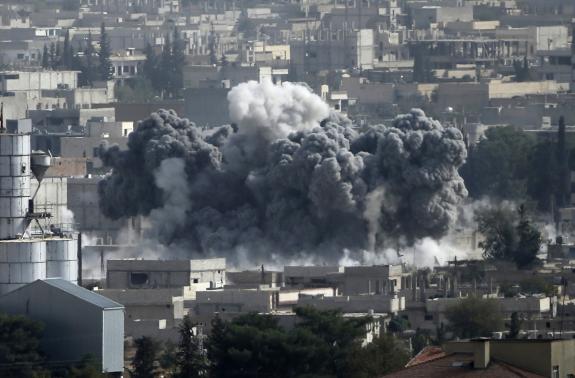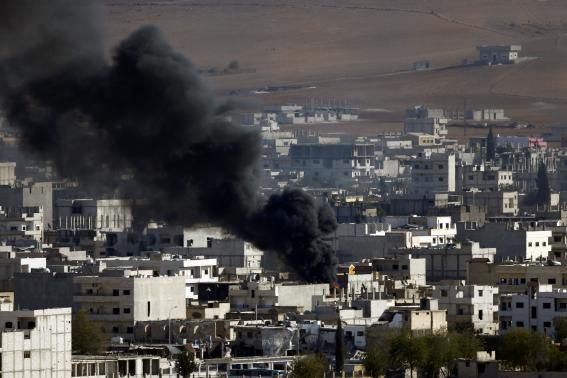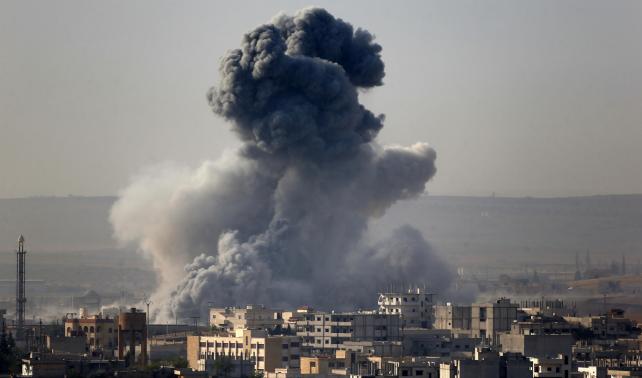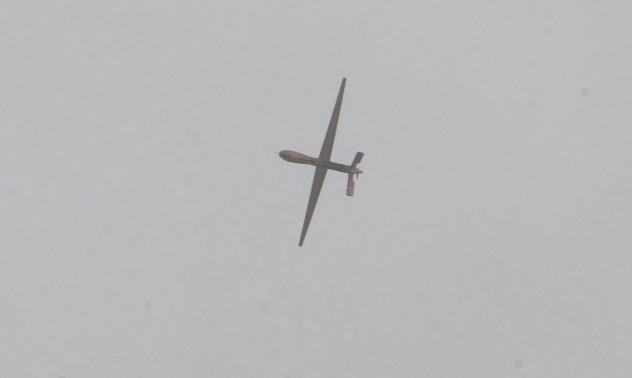www.aljazeerah.info
News, October 2014
Archives
Mission & Name
Conflict Terminology
Editorials
Gaza Holocaust
Gulf War
Isdood
Islam
News
News Photos
Opinion Editorials
US Foreign Policy (Dr. El-Najjar's Articles)
www.aljazeerah.info
|
Editorial Note: The following news reports are summaries from original sources. They may also include corrections of Arabic names and political terminology. Comments are in parentheses. |
US-Led Air Strikes Intensify Against Islamic State Fighters, Syria Conflict Destabilizes Turkey
October 12, 2014
 |
 |
 |
 |
Obama predicts "long-term campaign" against IS
English.news.cn 2014-10-15 10:56:46
WASHINGTON, Oct. 14, 2014, 2014 (Xinhua) --
U.S. President Barack Obama on Tuesday warned that there would be periodic "setbacks" in the fight against the Islamic State (IS), saying it is "a long-term campaign."
"This is going to be a long-term campaign; there are no quick fixes involved," Obama said after a meeting with coalition military leaders at Joint Base Andrews in the U.S. state of Maryland.
There are "going to be periods of progress and setbacks," he added.
The president acknowledged that the terror network, which controls large swaths of land in Iraq and Syria, does not present a "classic" military challenge.
"What we're also fighting is ideological," Obama said, appealing that the United States and the rest of the 60 nations participating in the effort against IS be "united in our goal."
The meeting with international military leaders, top White House officials, and top Pentagon brass was held amid new fears that IS is still making gains in both Iraq and Syria despite a U.S.-led bombing campaign.
IS forces have reportedly captured a military training camp in western Iraq and lobbed bombs at Baghdad suburbs, sparking concerns that the Iraqi military is not up to the fight.
But the White House maintained that despite some of the troubling news, the president's plan against IS was "succeeding."
"We're in the early days of the execution of that strategy," said press secretary Josh Earnest during a White House press briefing on Tuesday. "But certainly the early evidence indicates that this strategy is succeeding."
Earnest pointed out that U.S. humanitarian missions successfully protected Iraqi minorities under siege from IS, and had also driven the group from a pair of crucial dams.
But he also conceded that without ground forces, the United States would not be able to prevent all IS advances.
"I don't think anybody has sought to leave you or anyone else with the impression that these kinds of airstrikes were going to dramatically reverse the situation on the battlefield overnight. They won't. We've been pretty candid about the fact that this is a longer-term proposition," Earnest said.
Editor: yanting
180,000 people flee Iraqi city of Hit: UNHCR
English.news.cn 2014-10-14 22:43:02
GENEVA, Oct. 14, 2014 (Xinhua) --
The capture of a central Iraqi town of Hit over the weekend by Islamic State (IS) militants and affiliated armed groups caused an estimated 180,000 people to flee, the Office of the United Nations High Commissioner for Refugees (UNHCR) said on Tuesday.
Hit, located some 180 km to the west of the capital Baghdad, used to be a safe haven for those who had fled earlier waves of violence in Ramadi, Fallujah and other parts of Anbar province which borders Syria, and provided shelter for some 100,000 displaced people.
But the latest IS military offensive triggered a fresh wave of displacements that led residents there flee to other places in Anbar and further a field in Baghdad.
"The exodus from Hit represents the fourth major wave of displacement in less than a year in Iraq, and for many of those caught up in it, it is the second, third or even fourth time that they have had to flee since January," Melissa Fleming, UNHCR spokesperson, told a press conference.
"Tens of thousands of desperate Iraqis are now caught in a rolling wave of multiple displacements amidst the conflict's shifting frontlines," she added.
UNHCR said that an estimated 1.8 million citizens have been internally displaced this year throughout Iraq, in addition to around a million existing internally-displaced persons who had fled violence in previous years.
The UN refugee agency is sending relief items including mattresses, jerry cans, and blankets to those displaced, but it highlighted that humanitarian access to large parts of Anbar province is extremely limited by the conflict.
Meanwhile, UNHCR drew attention to the increasing number of Syrian Kurds taking shelter in northern Iraq after having fled the besieged border town of Kobane in Syria.
Statistics from the agency showed that some 5,400 Syrians from Kobane have now entered Iraq via Turkey, including 3,600 people in the last three days, and another 10,000 to 15,000 people are expected to cross in the coming days.
The security situation has deteriorated drastically in Iraq since June 10, when bloody clashes broke out between Iraqi security forces and hundreds of IS militants, who took control of the country's northern city of Mosul and later seized swathes of territories after Iraqi security forces abandoned their posts in Nineveh and other predominantly Sunni provinces.
Editor: yan
***
U.S.-led air strikes intensify as Syria conflict destabilizes Turkey
By Humeyra Pamuk and Daren Butler
MURSITPINAR Turkey/ISTANBUL Wed Oct 15, 2014 2:01pm EDT
(Reuters) -
American-led forces have sharply intensified air strikes in the past two days against Islamic State fighters threatening Kurds on Syria's Turkish border after the jihadists' advance began to destabilize Turkey.
The coalition had conducted 21 attacks on the militants near the Syrian Kurdish town of Kobani over Monday and Tuesday and appeared to have slowed Islamic State advances there, the U.S. military said, but cautioned the situation remained fluid.
U.S. President Barack Obama voiced deep concern on Tuesday about the situation in Kobani as well as in Iraq's Anbar province, which U.S. troops fought to secure during the Iraq war and is now at risk of being seized by Islamic State militants.
"Coalition air strikes will continue in both of these areas," Obama told military leaders from coalition partners including Turkey, Arab states and Western allies during a meeting outside Washington.
The fight against Islamic State will be among the items on the agenda when Obama holds a video conference on Wednesday with British, French, German and Italian leaders, the White House said.
War on the militants in Syria is threatening to unravel a delicate peace in neighboring Turkey where Kurds are furious with Ankara over its refusal to help protect their kin in Syria.
The plight of the Syrian Kurds in Kobani provoked riots among Turkey's 15 million Kurds last week in which at least 35 people were killed.
Turkish warplanes were reported to have attacked Kurdish rebel targets in southeast Turkey after the army said it had been attacked by the banned PKK Kurdish militant group, risking reigniting a three-decade conflict that killed 40,000 people before a ceasefire was declared two years ago.
Kurds inside Kobani said the U.S.-led strikes on Islamic State had helped, but that the militants, who have besieged the town for weeks, were still on the attack.
"Today there were air strikes throughout the day, which is a first. And sometimes we saw one plane carrying out two strikes, dropping two bombs at a time," said Abdulrahman Gok, a journalist with a local Kurdish paper who is inside the town.
"The strikes are still continuing," he said by telephone, as an explosion sounded in the background.
"In the afternoon, Islamic State intensified its shelling of the town," he said. "The fact that they're not conducting face-to-face, close-distance fight but instead shelling the town from afar is evidence that they have been pushed back a bit."
Asya Abdullah, co-chair of the dominant Kurdish political party in Syria, PYD, said the latest air strikes had been "extremely helpful". "They are hitting Islamic State targets hard and because of those strikes we were able to push back a little. They are still shelling the city center."
It was the largest number of air strikes on Kobani since the U.S.-led campaign in Syria began last month, the Pentagon said. The White House said the impact was constrained by the absence of forces on the ground but that evidence so far showed its strategy was succeeding.
CEASEFIRE THREATENED
The Turkish Kurds' anger and resulting unrest is a new source of turmoil in a region consumed by Iraqi and Syrian civil wars and an international campaign against Islamic State fighters.
The PKK accused Ankara of violating the ceasefire with the air strikes, on the eve of a deadline set by its jailed leader to salvage the peace process.
"For the first time in nearly two years, an air operation was carried out against our forces by the occupying Turkish Republic army," the PKK said. "These attacks against two guerrilla bases at Daglica violated the ceasefire," the PKK said, referring to an area near the border with Iraq.
Obama, who ordered the bombing campaign that started in August against Islamic State fighters, told the meeting of military leaders from 22 countries to expect a "long-term effort" in the battle against Islamic State militants.
"There will be days of progress and there are going to be some periods" of setbacks, he said.
A U.S. military official told Reuters after the talks there was an acknowledgement that Islamic State was making some gains on the ground, despite the air strikes. But there was also a sense that the coalition, working together, would ultimately prevail, the official said.
"In the short term, there are some gains that they have been able to make. In the long term, that momentum will be reversed," the official said, adding the coalition would adjust its tactics as Islamic State fighters increasingly blend into the population and become harder to target.
Washington has faced the difficult task of building a coalition to intervene in Syria and Iraq, two countries with complex multi-sided civil wars in which most of the nations of the Middle East have enemies and clients on the ground.
In particular, U.S. officials have expressed frustration at Turkey's refusal to help them fight against Islamic State. Washington has said Turkey has agreed to let it strike from Turkish air base. Ankara has said that is still under discussion.
NATO-member Turkey has refused to join the coalition unless it also confronts Syrian President Bashar al-Assad, a demand that Washington, which flies its air missions over Syria without objection from Assad, has so far rejected.
U.S. Secretary of State John Kerry said on Tuesday there was no discrepancy between Ankara and Washington over the strategy for fighting Islamic State in Kobani and that Ankara would define its role according to its own timetable.
The fate of Kobani, where the United Nations says thousands could be massacred, could wreck efforts by the Turkish government to end the insurgency by PKK militants, a conflict that largely ended with the start of a peace process in 2012.
The peace process with the Kurds is one of the main initiatives of President Tayyip Erdogan's decade in power, during which Turkey has enjoyed an economic boom underpinned by investor confidence in future stability.
The unrest shows the difficulty Turkey has had in designing a Syria policy. Turkey has already taken in 1.2 million refugees from Syria's three-year civil war, including 200,000 Kurds who fled the area around Kobani in recent weeks.
'PROVOCATIONS COULD BRING MASSACRE'
Jailed PKK co-founder Abdullah Ocalan has said peace talks between his group and the Turkish state could come to an end by Wednesday. After visiting him in jail last week, Ocalan's brother Mehmet quoted him as saying: "We will wait until October 15. ... After that there will be nothing we can do."
A pro-Kurdish party leader read out a statement from Ocalan in parliament on Tuesday in which the PKK leader said Kurdish parties should work with the government to end street violence.
"Otherwise we will open the way to provocations that could bring about a massacre," Ocalan said in the statement, which the party said he wrote last week.
Turkish attacks on Kurdish positions were once a regular occurrence in southeast Turkey but had not taken place for two years. The PKK said the strikes took place on Monday, although some Turkish news reports said they happened on Sunday.
Prime Minister Ahmet Davutoglu said the Turkish military had retaliated against a PKK attack in the border area, without referring specifically to air strikes.
Hurriyet newspaper said the air strikes caused "major damage" to the PKK. "F-16 and F-4 warplanes which took off from (bases in the southeastern provinces of) Diyarbakir and Malatya rained down bombs on PKK targets after they attacked a military outpost in the Daglica region," Hurriyet said.
'TOO LATE FOR US'
The battle for Kobani has ground on for nearly a month, although Kurdish fighters on Monday managed to replace an Islamic State flag in the West of the town with one of their own. The fighters, known as Popular Protection Units (YPG) want Turkey to allow them to bring arms across the border.
In the Turkish town of Suruc, 10 km (6 miles) from the Syrian frontier, a funeral for four female YPG fighters was being held. Hundreds at the cemetery chanted: "Murderer Erdogan".
At least six air strikes, gunfire and shelling could be heard from Mursitpinar on the Turkish side of the border on Tuesday, where Kurds, many with relatives fighting in Kobani, have maintained a vigil, watching the fighting from hillsides.
In Iraq, Kurdish forces and government troops have rolled back some Islamic State gains in the north of the country in recent weeks, but the fighters have advanced in the west, seizing territory in the Euphrates valley within striking distance of the capital, Baghdad.
Members of Iraq's Shi'ite minority have been targeted by recent bomb attacks in Baghdad, some claimed by Islamic State. On Tuesday, 25 people were killed by a car bomb, including a Shi'ite Muslim member of Iraq's parliament.
(Additional reporting by Jeff Mason, Steve Holland, Roberta Rampton and Phil Stewart in Washington; Writing by Peter Graff, Oliver Holmes and Philippa Fletcher; Editing by David Stamp, Toni Reinhold and Peter Cooney)
***
Share this article with your facebook friendsFair Use Notice
This site contains copyrighted material the
use of which has not always been specifically authorized by the copyright
owner. We are making such material available in our efforts to advance
understanding of environmental, political, human rights, economic,
democracy, scientific, and social justice issues, etc. We believe this
constitutes a 'fair use' of any such copyrighted material as provided for
in section 107 of the US Copyright Law. In accordance with Title 17 U.S.C.
Section 107, the material on this site is
distributed without profit to those
who have expressed a prior interest in receiving the included information
for research and educational purposes. For more information go to: http://www.law.cornell.edu/uscode/17/107.shtml.
If you wish to use copyrighted material from this site for purposes of
your own that go beyond 'fair use', you must obtain permission from the
copyright owner.
|
|
|
|
||
|
||||||


